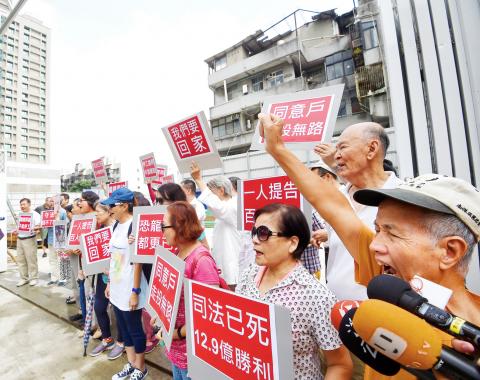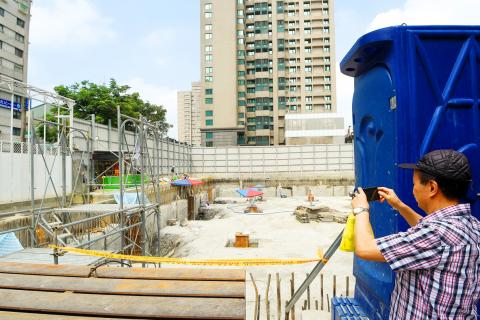Landowners supporting an urban renewal project in Taipei’s Yongchun Community (永春) yesterday protested the Supreme Administrative Court’s decision to uphold an earlier ruling against the Taipei City Government.
The initial ruling in the 16-year-old case said that Taipei’s approval of changes to building plans for the urban renewal project in Xinyi District (信義) filed by Senyeh Construction Co (森葉營造建設) in 2014 were illegal.
It is unacceptable that the rights and interests of the 99 percent of landowners who agreed to the project are trampled by the refusal of the minority, just one family, protesters said.

Photo: Fang Pin-chao, Taipei Times
One protester said her family agreed to the project because her father had found it increasingly difficult to climb the stairs in their building, but her father died 10 years ago and the project has still not begun.
Her mother criticized the city government, saying she agreed to the project because she believed that only 80 percent of owners whose land would be used for the new construction had to agree for the project to move forward.
She said she does not understand how it is illegal to enforce tearing down houses after the Wang (王) family incident in Shilin District (士林), calling on the city government to “take responsibility and stop playing politics.”

Photo: Fang Pin-chao, Taipei Times
The Wang incident refers to the Wenlin Yuan (文林苑) urban renewal project, in which Wang Kuang-shu (王廣樹) did not agree to his land being used and filed lawsuits after the forced demolition of his house.
The High Administrative Court dismissed Wang’s claims and ordered that his land be included in the project, as his property was not on a roadside and there was not enough room to build a house on it should it be excluded.
The Wang family in 2014 negotiated an out-of-court settlement with the developer.
Taipei Mayor Ko Wen-je (柯文哲) yesterday said that the city would continue to promote urban renewal projects.
The city government has passed a bill authorizing a settlement system for opponents of projects, Ko said, adding that it would establish a task force to handle complaints that predate the system, such as the Yongchun project.
As Senyeh had already removed buildings occupied by opponents of the project and begun construction when the Supreme Administrative Court upheld the ruling, the city government needs to call for a change to building plans, revoke building permits and temporarily halt construction, Ko said.
However, urban renewal projects in Taipei must continue, not only for the sake of the city’s aesthetics, but also for the safety of its residents, he added.
The ruling did not entirely shut down the Yongchun project, Taipei Deputy Mayor Charles Lin (林欽榮) said in a statement, but it would drag out the process even longer.
The task force would finalize all administrative proceedings in accordance with the Supreme Administrative Court’s ruling, Lin said.
Additional reporting by CNA

Authorities have detained three former Taiwan Semiconductor Manufacturing Co (TMSC, 台積電) employees on suspicion of compromising classified technology used in making 2-nanometer chips, the Taiwan High Prosecutors’ Office said yesterday. Prosecutors are holding a former TSMC engineer surnamed Chen (陳) and two recently sacked TSMC engineers, including one person surnamed Wu (吳) in detention with restricted communication, following an investigation launched on July 25, a statement said. The announcement came a day after Nikkei Asia reported on the technology theft in an exclusive story, saying TSMC had fired two workers for contravening data rules on advanced chipmaking technology. Two-nanometer wafers are the most

DEFENSE: The first set of three NASAMS that were previously purchased is expected to be delivered by the end of this year and deployed near the capital, sources said Taiwan plans to procure 28 more sets of M-142 High Mobility Artillery Rocket Systems (HIMARS), as well as nine additional sets of National Advanced Surface-to-Air Missile Systems (NASAMS), military sources said yesterday. Taiwan had previously purchased 29 HIMARS launchers from the US and received the first 11 last year. Once the planned purchases are completed and delivered, Taiwan would have 57 sets of HIMARS. The army has also increased the number of MGM-140 Army Tactical Missile Systems (ATACMS) purchased from 64 to 84, the sources added. Each HIMARS launch pod can carry six Guided Multiple Launch Rocket Systems, capable of

Tsunami waves were possible in three areas of Kamchatka in Russia’s Far East, the Russian Ministry for Emergency Services said yesterday after a magnitude 7.0 earthquake hit the nearby Kuril Islands. “The expected wave heights are low, but you must still move away from the shore,” the ministry said on the Telegram messaging app, after the latest seismic activity in the area. However, the Pacific Tsunami Warning System in Hawaii said there was no tsunami warning after the quake. The Russian tsunami alert was later canceled. Overnight, the Krasheninnikov volcano in Kamchatka erupted for the first time in 600 years, Russia’s RIA

CHINA’s BULLYING: The former British prime minister said that he believes ‘Taiwan can and will’ protect its freedom and democracy, as its people are lovers of liberty Former British prime minister Boris Johnson yesterday said Western nations should have the courage to stand with and deepen their economic partnerships with Taiwan in the face of China’s intensified pressure. He made the remarks at the ninth Ketagalan Forum: 2025 Indo-Pacific Security Dialogue hosted by the Ministry of Foreign Affairs and the Prospect Foundation in Taipei. Johnson, who is visiting Taiwan for the first time, said he had seen Taiwan’s coastline on a screen on his indoor bicycle, but wanted to learn more about the nation, including its artificial intelligence (AI) development, the key technology of the 21st century. Calling himself an